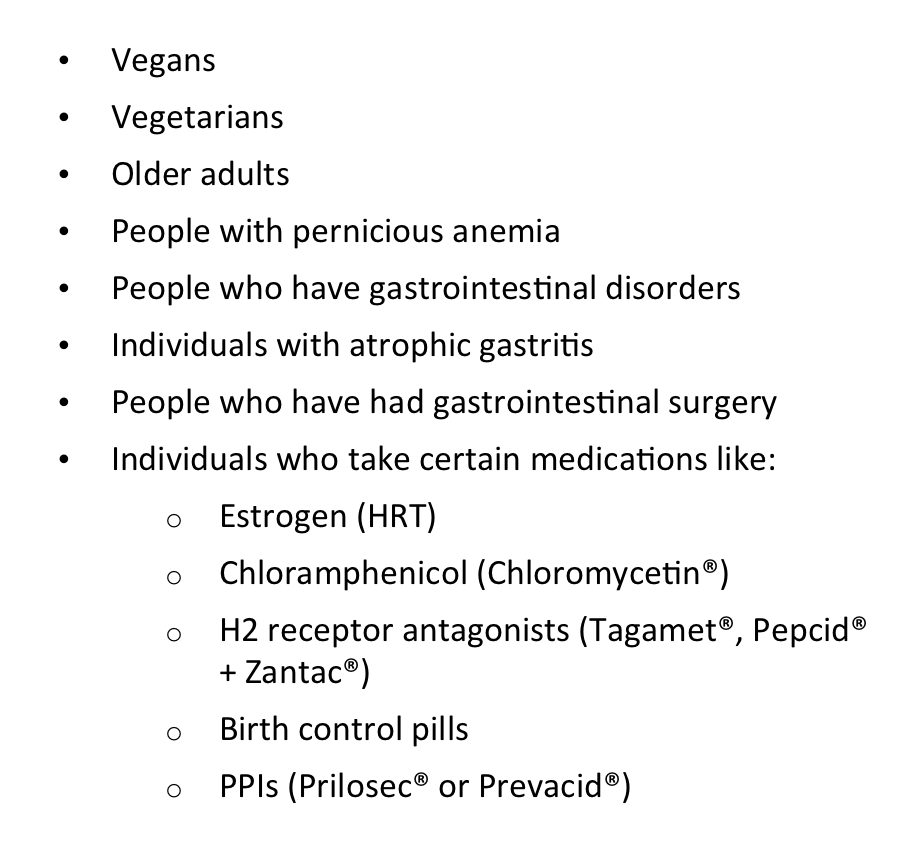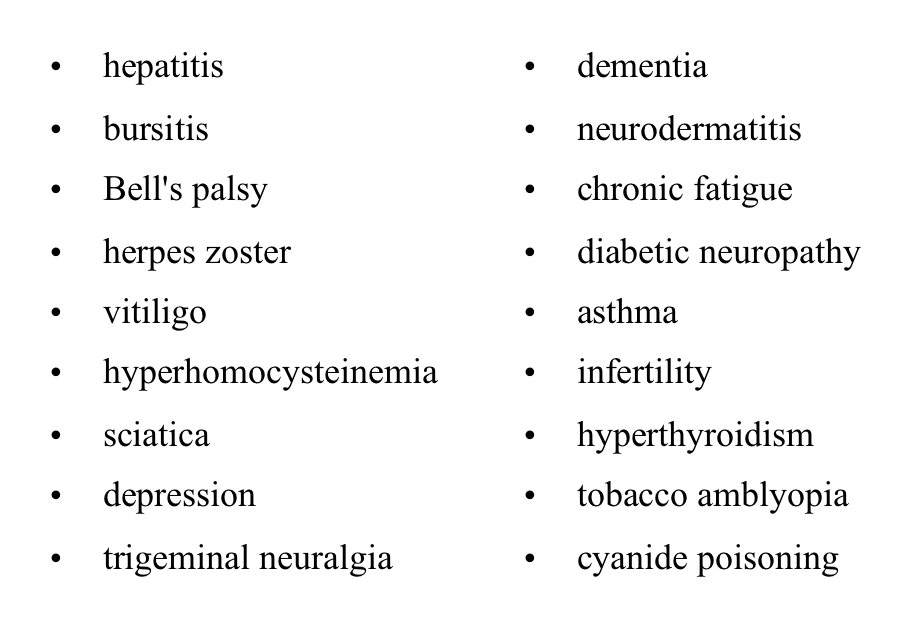
You’ve probably noticed how often vitamin B12 appears in internet searches these days. And rightly so. We need to keep an eye on it: Lack of B12 is one of the most common vitamin deficiencies, and it’s not something to mess around with.
Why? Because B12 deficiency (which is pretty common, actually) affects your brain, vision, skin, and energy levels. That’s pretty scary. If left untreated, it can lead to
- Heart palpitations and shortness of breath
- Weakness, tiredness, or lightheadedness
- Pale skin
- Vision loss
- Constipation, diarrhea, loss of appetite, or gas
- A smooth tongue
- Depression
- Memory loss
- Behavioral changes
- Numbness or tingling
- Muscle weakness
- Problems walking
And if that’s not enough (and we’re truly not trying to give you the wobbles here!), low levels of B12 can be linked to the development of pernicious anemia, dementia, or osteoporosis.
Did we say it wasn’t something to be messed with?
But please don’t close your device and hope your symptoms will go away. We can help you sort out any B12 deficiency quite quickly once we’ve diagnosed it.
So, if you’re even suspecting you need extra B12, read on to discover what B12 actually is, and how to ensure you get enough of it to stay healthy and well.
We’ll also explain the best way to receive it and then give you the 10 facts you’ll need to know about B12 shots for when you’re ready to go ahead.
So What is Vitamin B12?
Vitamin B12 (cobalamin) is a water-soluble vitamin that plays a vital role in brain function and the production of DNA and red blood cells. It also has a part to play in approximately 100 vital bodily functions, including:
- Protein conversion
- DNA synthesis
- Fatty acid production
- Neurological function
Chemically, vitamin B12 exists in many different forms – the common factor being they all contain the mineral cobalt.
It can take a few years to develop a deficiency because your body can store B12 in your liver for a long time.
But because your body can’t make B12 on its own, you do need to get it from your diet or supplements. It’s naturally available from animal products, including fish, meat, poultry, eggs, milk, and milk products – but it’s not usually present in plant foods. And even some meat eaters don’t absorb it as well as they might.
For those of you who don’t eat meat and dairy products, there are fortified foods on the market, like breakfast cereals, that can be used as a readily available source of vitamin B12.
How Much B12 Do You Need to Be Healthy?
The recommended daily intake (RDI) of vitamin B12 for adults is 6 micrograms per day. Providers advise vegetarians and vegans to take at least 10 mcg per day, or at least 2,000 mcg once per week.
Who Tends to Be B12 Deficient?
People who are B12 deficient either don’t get enough of the nutrient in their diet, or they have a difficult time absorbing the nutrient. B12 absorption depends on a protein produced in your stomach called intrinsic factor.
This protein binds to vitamin B12, which allows your body to absorb it into the blood. If your body doesn’t produce enough intrinsic factor, it can become B12 deficient.
The people with the highest risk of B12 insufficiency or deficiency are:

Figure 1: Those most at risk of B12 deficiency
What’s the Most Efficient Way to Supplement B12?
Liquid B12s have become more and more effective at delivering Vitamin B12 to the body, but B12 shots are the most efficient way to prevent or treat a deficiency.
Why Are B12 Shots Better Than Oral Supplements?
If you have trouble with nutrient absorption due to the presence of intestinal inflammation, poor gut health, or a deficiency of those intrinsic factors we mentioned, then taking an oral supplement may not be that helpful.
On the other hand, injecting nutrients directly to the cells via the muscles feeds your body instantaneously for immediate use.
Do I Need Vitamin B12 Injections?
People who eat a well-balanced diet that includes foods rich in vitamin B12, usually don’t need to take additional B12. But if you saw yourself in any of the risk factors listed in Figure 1, then you’ll probably need to take supplements.
If you think you may be deficient, contact us to talk to one of our doctors or a dietician about your options. They’ll use your medical history, diet, and blood test results to determine the best course of action.
Are B12 Shots Prescription-Only?
Yes. Any solution that gets injected into the body is Rx only.
You must obtain a prescription from a doctor whose scope of practice allows them to prescribe drugs (MD, DO, ND/NMD) or a nurse with prescription rights who is under the direct supervision of a physician.
What Else Does B12 Treat?
Aside from being used to supplement low blood levels, B12 has been used to treat a variety of conditions, including:

Figure 2: What else can B12 treat?
B12 also boosts energy, improves sleep, increases serotonin to elevate mood, increases focus, and regulates hormones. What’s not to like?
10 Need-to-Know Facts About Vitamin B12 Injections
1 Side Effects
Providers consider Vitamin B12 injections to be very safe, resulting in no significant side effects. In very rare cases, some people have had side effects caused by an allergic reaction or sensitivity.
Because of how the injections deliver B12, you may experience some discomfort, redness, bruising, inflammation, itching, or tenderness near the injection site. This discomfort could last from a few minutes to several days.
You may also notice the completely benign side effect of pinkish or reddish urine! If you’ve received more B12 than your body can use and store, your kidneys will flush out the extra – and because injected B12 is red, your urine may be pink or reddish.
Side effects that occur less frequently are lightheadedness, nausea, fatigue, headache, dizziness, warmth, or flushing.
Having a true allergic reaction is extremely rare. But if it were to occur, you could experience throat swelling, an itchy body rash, dangerously low blood pressure, or symptoms associated with anaphylaxis (throat swelling, trouble breathing). If these side effects occur, visit your nearest emergency department without hesitation or call 9-1-1.
2 Vitamin B12 Shots Are Sterile
If you go to a trusted source like your doctor or nurse practitioner, you shouldn’t have to worry about whether or not the injections are sterile. Healthcare providers purchase injectable solutions from certified compounding pharmacies.
Further detail about this, if you like that sort of thing:
These pharmacies are generally certified through the Pharmacy Compounding Accreditation Board (PCAB). Eight of the nation’s leading pharmacy organizations formed this nonprofit organization.
Not only does PCAB provide a voluntary accreditation program for compounding pharmacies across the country, they promote, develop, and maintain principles, policies, and standards for improving the quality of pharmacy compounding nationwide.
Laboratories and manufacturing facilities that make the injections are certified by globally recognized institutions such as the US Food and Drug Administration (FDA). They also meet validated manufacturing standards such as Good Manufacturing Practice (GMP).
3 Vitamin B12 Shots Are Safe
All vitamin shots are water-soluble and safe. However, there are certain health conditions and circumstances that may be negatively affected by the injections, including:
- Pregnancy
- Breastfeeding
- Cancer
- Advanced liver disease
- Seriously compromised kidney function
- Hypotension
Your healthcare provider will be able to guide you as to whether B12 injections are right for you.
4 Your Provider Injects Vitamin B12 Shots Intramuscularly
This means the solution gets injected directly into your muscles. B12 shots are typically administered in the upper outer quadrant of the gluteal muscle (the gluteus medius). This area is just above the hip region and not directly on the buttock.
5 B12 Shots Work Quickly
A response is usually seen within 48 to 72 hours, with brisk production of new red blood cells.
Typically, you feel the effects of a B12 shot for about one week. B12 can be stored in the body. If your body doesn’t use all the B12 immediately, it will store it for later.
6 You May Need More Than One Shot
If you’re suffering from a severe deficiency or severe symptoms, you may need to get five to seven shots during the first week of treatment to restore the body’s reserves.
Depending on your condition, after your first round of shots, your doctor may keep you on a regular regimen of shots or shift you to other delivery systems like pills or liquids.
7 You Can Manage any Pain from the Shots
Every person has a different pain tolerance. We understand that. There are, however, factors that can increase or decrease how you experience pain from a shot.
Pain is more common if you’re tense, dehydrated, or you’ve just worked out the muscle into which the shot is being injected.
If you’re relaxed in both mind and body, well-nourished and hydrated, and haven’t been working out that muscle, you’re likely to experience less pain. Keeping hydrated also decreases the risk of bruising from an injection.
Our goal is to administer shots so that they cause little to no pain. We will instruct you on how to stand and breathe for the most comfortable experience.
Keep in mind – if you’re someone who wears heel, this tenses up your glutes, so you may want to remove your shoes during the injection or not wear them at all that day!
8 Bruising is Rare But Can Happen
Most of the time, the injection will cause no bruising. The possibility of bruising increases if you’re taking a medication or supplement that thins the blood like warfarin, Coumadin, aspirin, fish oil, Ginkgo Biloba, or garlic.
Thinning skin, vasculitis, purpuric dermatosis, platelet deficiency, liver disease, vitamin K deficiency, vitamin C deficiency, moving your body during the injection, or dehydration may also cause bruising.
9 Getting a B12 Shot Earlier in the Day Will Decrease the Chance of Insomnia
B12 shots do not contain any stimulants, but depending on how sensitive you are, getting the shot in the evening may lead to vivid dreams or insomnia.
It’s best to have a shot administered before 6:00 pm. When not taken too late in the day, Vitamin B12 can help promote deeper, healthier sleep.
10 B12 Shots: the Cost
The average cost of a B12 shot, depending on your location, ranges from $20 to $77. Depending on why your doctor has prescribed B12 shots, these may or may not be covered by your insurance plan. You’ll need to check with your insurance provider.
EVEXIAS Denver Can Help!
If you’ve been experiencing any of the symptoms of a B12 deficiency we mentioned, or you just need a boost of energy, we’ve got you covered.
Our services at EVEXIAS Denver include the prescription and administration of Vitamin B12 shots. So don’t hesitate to call (719) 625-8045 with questions or to make an appointment. You can also get in touch by filling out our online contact form.
Schedule your comprehensive consultation today and we’ll discuss your symptoms, health history, and the root cause of your health concerns. After we have the big picture of your health, we’ll decide what diagnostic tests or labs will be necessary.
We’ll then use our findings to develop the best treatment plan that’s in line with your health goals and lifestyle.
